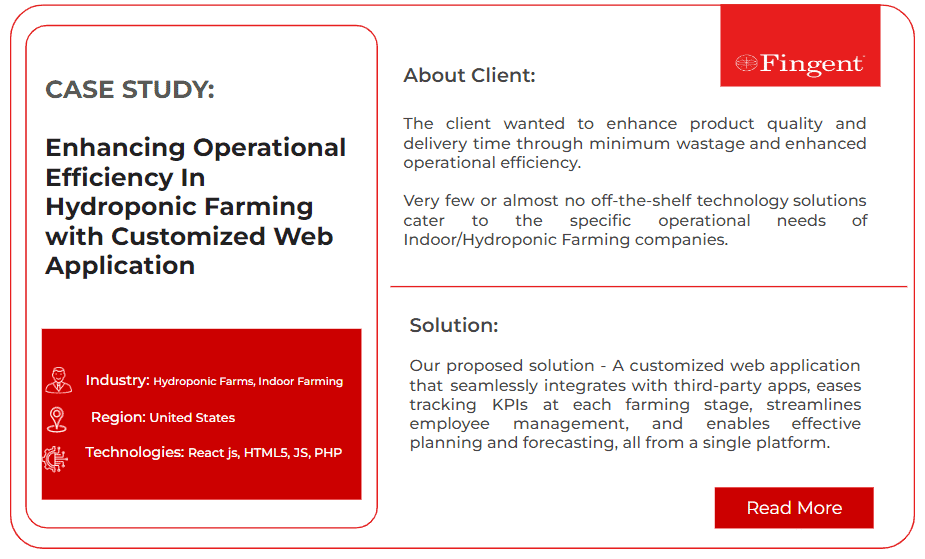Driving Smart and Sustainable Agriculture with Customized Technology!
As the world grapples with the challenges of climate change, soil degradation, and resource scarcity, agricultural organizations find themselves at a critical juncture. The urgency for adopting sustainable farming practices, amplified by the integration of custom software, has never been more pronounced. This blog explores the pivotal role of digital transformation in achieving sustainability, shedding light on why agricultural organizations should embrace this shift.
Why the Focus on Sustainable Farming?
The urgency stems from a dual challenge: preserving the environment and securing the economic viability of agricultural operations. Inefficient practices impact the bottom line, making sustainability not just a moral duty but a financial necessity.
The Impact of Digital Transformation in Agriculture
Digital transformation, powered by Artificial Intelligence (AI), Data Analytics, and Cloud solutions, represents a seismic shift in farming approaches. The focus isn’t on whether to adopt these technologies but on how fast agricultural organizations can leverage them for sustainable growth.
To understand why agricultural organizations should embrace digital transformation, let’s consider some use cases.
1. AI in Agriculture: Precision Farming for Optimal Results
Use Case: Crop Yield Prediction
One significant application of AI in agriculture is crop yield prediction. AI algorithms analyze historical weather patterns, soil conditions, and crop health data to forecast optimal planting times and expected yields. For instance, a predictive AI model can take into account variables like temperature, precipitation, and crop health data to help farmers make data-driven decisions, maximizing yield with minimal resource use.
2. Data Analytics: Informed Decision-Making in Real Time
Use Case: Soil Health Monitoring
Data Analytics plays a crucial role in monitoring soil health in real-time. Sensors placed in the soil collect data on moisture levels, nutrient content, and temperature. Data Analytics algorithms process this information, providing farmers with immediate insights into soil conditions. By understanding these factors, farmers can adjust irrigation, fertilizer application, and other practices to optimize crop growth.
3. Big Data: Navigating Trends for Long-Term Success
Use Case: Market Trend Analysis
Big Data is instrumental in analyzing market trends to help farmers make informed decisions about crop selection and pricing. By aggregating and analyzing data from various sources, such as global market trends, consumer preferences, and weather patterns, farmers can strategically plan their crop rotations and adapt to changing market demands.
4. Cloud: Scalability and Flexibility for Modern Farms
Use Case: Remote Monitoring and Management
Cloud solutions enable remote monitoring of farming operations. Farmers can access real-time data on crop conditions, equipment status, and weather patterns from anywhere. This level of accessibility enhances decision-making and allows for timely responses to changing conditions.
Use Case: Collaborative Farming Platforms
Cloud-based collaborative platforms facilitate information sharing among farmers. This includes sharing insights on best practices, weather forecasts, and market trends. Such platforms promote collaboration, helping farmers make collective decisions for mutual benefit.
5. In-Depth Custom Software: Tailored Solutions for Agricultural Challenges
Elaborating on custom software solutions, let’s explore specific examples of how custom software has been tailored to address challenges in agriculture:
Example: Crop Management System
A custom Crop Management System can integrate AI and Data Analytics to provide farmers with comprehensive insights into crop health, soil conditions, and weather forecasts. This solution tailors its algorithms to the specific crops grown on a farm, offering personalized recommendations for irrigation schedules, fertilization, and pest control.
Example: Supply Chain Optimization Software
Custom software designed for supply chain optimization in agriculture integrates Big Data analytics. It tracks the entire supply chain, from harvest to distribution, optimizing routes, storage conditions, and inventory management. This ensures that produce reaches its destination in optimal condition, reducing waste and maximizing profitability.
Challenges in Leveraging Technologies in Farming Processes
Although the decision to implement technology in the farming process seems like a no-brainer, there have been a few challenges on the way.
1. Complex Procedures: Navigating the Intricacies
The adoption of technology in farming processes is not a simple plug-and-play endeavor. Farming operations are intricate and interconnected. Addressing these complexities requires a strategic approach that acknowledges the nuances of each operation.
2. Legacy Systems: Breaking Free from the Past
Many agricultural operations are shackled by legacy systems that were implemented in a different era. These systems, while once effective, now hinder the integration of modern digital solutions. Overcoming this challenge involves strategic investments in upgrading or replacing outdated infrastructure.
3. Staff Onboarding: Bridging the Knowledge Gap
The success of digital transformation hinges on the people behind the technology. Onboarding staff with new technology presents a unique set of challenges, from upskilling the existing workforce to recruiting new talent. A comprehensive training strategy is essential to ensure that the human element seamlessly integrates with the digital landscape.
As the farming industry stands at the crossroads of tradition and innovation, the role of custom software becomes increasingly pivotal. So, let us explore how custom software serves as the linchpin in driving the right digital transformation for agriculture.
Custom Software: Tailoring Innovation to Agricultural Realities
Custom software addresses the complexities of modern farming, offering tailored solutions that off-the-shelf options often lack. It eases the digital transformation journey, ensuring a seamless integration of technology into existing processes. Here are some ways in which challenges can be addressed:
- Addressing Procedural Complexity: Custom software streamlines intricate procedures without disrupting established workflows, ensuring a seamless integration of new technologies.
- Compatibility with Legacy Systems: Designed to coexist with legacy systems, custom software serves as a strategic bridge, preventing the need for a costly infrastructure overhaul.
- Staff Empowerment through Training Solutions: Custom software includes comprehensive training modules, empowering staff to leverage the full potential of new technologies.
How Can Fingent Help?
At Fingent, we understand that the path to sustainable and efficient farming is paved with innovative, custom solutions. Our expertise extends across three crucial phases of the digital transformation journey: discovery, development, and implementation.
- Discovery Phase: Fingent collaborates closely with agricultural businesses to identify opportunities for digital transformation. Through meticulous analysis, we uncover areas for improvement in resource management, data utilization, and operational efficiency.
- Development Phase: Armed with insights, our seasoned developers craft custom software solutions designed to address the unique challenges of each farm. From precision farming tools to supply chain management systems, our goal is to optimize operations and enhance overall efficiency.
- Implementation with 24/7 Backup: The journey doesn’t end with software development. Fingent provides robust implementation support with 24/7 backup, ensuring a smooth transition into the digital landscape. Our commitment is to minimize disruptions and maximize the benefits of sustainable farming practices.
A Greener Tomorrow, Powered by Digital Innovation
In the journey towards a sustainable future for farming, digital transformation is paramount. Custom software is the linchpin, simplifying complexities and seamlessly integrating technology into agricultural operations. At Fingent, we stand ready to be your dedicated partner, discovering opportunities, crafting tailored solutions, and offering unwavering support. With the right custom software, your farm can lead the way to a greener tomorrow.
Give us a call, and let’s get talking.
Stay up to date on what's new

Recommended Posts

28 Aug 2025
Choosing the Right SAP Implementation Partner: What Businesses Need to Know
SAP is a powerful tool for businesses only if implemented right. Otherwise, it’s budget overruns, messy integrations, and disappointing ROI. Choosing the right SAP implementation partner isn’t optional. It’s mission-critical.……

23 May 2025 Manufacturing B2B
How Digital Transformation in Manufacturing Is Rewriting the Future of Production
Walk into any modern factory today, and you will notice something different. No noisy jungle of machines. No conveyor belts. No caution tape. It is alive—with sensors, data dashboards, and……

20 Aug 2024 B2B
Legacy Software Modernization: An Inevitable Path For Businesses
Wine and wisdom get better with age. But software doesn't. That's why experts say legacy software modernization is inevitable for modern businesses. Picture this! Ten years ago, you might have……

15 May 2024 Financial Services B2B
Custom Payment Processing Solution: A Game Changer For Your Business
How can a custom payment processing solution change your business? The benefits are many: streamlined payment processes, safe transactions, easy fraud detection, and better customer experience. However, you might wonder……
Featured Blogs
Stay up to date on
what's new





















































